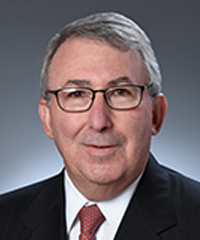Rheumatology
Rheumatoid Arthritis
Increasing Enthusiasm for Non–Tumor Necrosis Factor Biologic Monotherapy
Overview
Many patients with rheumatoid arthritis (RA) have a substantial intolerance to methotrexate (MTX) or a decreased quality of life with MTX. Biologic disease-modifying antirheumatic drugs (bDMARDs) and targeted synthetic disease-modifying antirheumatic drugs (tsDMARDs) are frequently used as monotherapy, either at the discretion of the physician or because of patient preference. Here, the expert panelists discuss this phenomenon, citing data that support the use of non–tumor necrosis factor (non-TNF) biologic monotherapy in such patients.
Q: How would you describe the growing enthusiasm for monotherapy in patients with RA, and what is the supporting evidence for non-TNF monotherapy?
Alan L. Epstein, MD
|
|
“We also have some data indicating that other drugs with other MOAs are perhaps a little bit more efficacious than an anti-TNF agent when used as monotherapy."
I think an interesting question clinically is that of the patient for whom one is contemplating the use of monotherapy (eg, the patient who can’t take MTX or leflunomide) and for whom one is thinking about using a bDMARD or a tsDMARD as a monotherapy. We do have some fairly decent data indicating that the anti-TNF agents are clearly more efficacious with concomitant MTX. We also have some data indicating that other drugs with other mechanisms of action (MOAs) are perhaps a little bit more efficacious than an anti-TNF agent when used as monotherapy.
So, I think that if you have someone who cannot take MTX, for whatever reason, or refuses to take it, it might be reasonable to go to a different MOA as your first bDMARD or your first tsDMARD—something other than an anti-TNF agent. Now, just to be clear, the anti-TNF agents certainly work as monotherapy; I have many patients who are on TNF monotherapy for a variety of reasons. However, if you look at the data (eg, monotherapy with an interleukin 6–inhibiting agent or with a Janus kinase [JAK]/signal transducer and activator of transcription inhibitor) patients seem to do better with such monotherapy than with TNF monotherapy.
Leonard H. Calabrese, DO
|
|
“I think that, in this era, we have appreciated the fact that it is not an insignificant number of people who have a substantial intolerance to MTX or a decreased quality of life with MTX, and now we have fabulous options for monotherapy in the absence of that.”
I think that there is increasing enthusiasm for monotherapy for a variety of reasons. MTX has been around a lot longer than biologics, and a lot of us have grown up with it, and, in previous times, there was really no other option. You took MTX, and if you were intolerant of it, we tried to do things and modify that to make it more tolerable. I think that, in this era, we have appreciated the fact that it is not an insignificant number of people who have a substantial intolerance to MTX or a decreased quality of life with MTX, and now we have fabulous options for monotherapy in the absence of that. Now, there is an economic reason to use MTX, and that’s a different story. Over and above that, there are lifestyle issues. There are people who are not optimal MTX candidates, in consideration of lifestyle, alcohol use, and other comorbidities. So, this group has come to light over the last several years, and many studies estimate that this group of patients may account for 30% or so of those who may be monotherapy candidates.
Stanley B. Cohen, MD
|
|
“I think that, over time, we’ll begin to shift the paradigm somewhat, as more data demonstrating the superiority of non-MTX treatments in early disease accumulate.”
Also, I think that some differences in terms of efficacy in early disease versus late disease are involved when it comes to the discussion of monotherapy. We now have studies with JAK inhibitors showing superiority to MTX in early disease—clinically and radiographically—in one study. Unfortunately, our hands are tied in the real world, and we don’t have the ability to use those medications first line. I think that, over time, we’ll begin to shift the paradigm somewhat, as more data demonstrating the superiority of non-MTX treatments in early disease accumulate.
Dr Epstein:
If you look at studies from across the world (with the exception of a study from Italy, where infliximab was a big part of it and there were different considerations involved), you really get the same numbers that Dr Calabrese just alluded to—which is about 30% of people who are not receiving MTX. Often, the use of MTX is driven by various patient factors, which may include preferences about alcohol consumption, intolerance to MTX, or the possibility of becoming pregnant, for instance.
Daniel E. Furst, MD
|
|
Some patients are just frankly quite fearful (eg, it’s a “chemotherapy drug” and they don’t want to take it). There are truly a large number of reasons—both good and not so good—why either patients don’t want to be on MTX or we, as physicians, don’t want our patients on MTX. And so, more and more, monotherapy is being discussed.
References
Backhaus M, Kaufmann J, Richter C, et al. Comparison of tocilizumab and tumour necrosis factor inhibitors in rheumatoid arthritis: a retrospective analysis of 1603 patients managed in routine clinical practice. Clin Rheumatol. 2015;34(4):673-681.
Burmester GR, Lin Y, Patel R, et al. Efficacy and safety of sarilumab monotherapy versus adalimumab monotherapy for the treatment of patients with active rheumatoid arthritis (MONARCH): a randomised, double-blind, parallel-group phase III trial. Ann Rheum Dis. 2017;76(5):840-847.
Ćalasan MB, van den Bosch OFC, Creemers MCW, et al. Prevalence of methotrexate intolerance in rheumatoid arthritis and psoriatic arthritis. Arthritis Res Ther. 2013;15(6):R217.
Catay E, Bravo M, Rosa J, Soriano ER. Prevalence of biologics monotherapy in a cohort of patients with rheumatoid arthritis in daily clinical practice. BMC Musculoskelet Disord. 2016;17:110.
Choy E, Aletaha D, Behrens F, et al. Monotherapy with biologic disease-modifying anti-rheumatic drugs in rheumatoid arthritis. Rheumatology (Oxford). 2017;56(5):689-697.
Detert J, Klaus P. Biologic monotherapy in the treatment of rheumatoid arthritis. Biologics. 2015;9:35-43.
Emery P, Sebba A, Huizinga TWJ. Biologic and oral disease-modifying antirheumatic drug monotherapy in rheumatoid arthritis. Ann
Rheum Dis. 2013;72(12):1897-1904.
Lee EB, Fleischmann R, Hall S, et al; ORAL Start Investigators. Tofacitinib versus methotrexate in rheumatoid arthritis. N Engl J Med. 2014;370(25):2377-2386.
Pappas DA, Reed GW, Saunders K, et al. Characteristics associated with biologic monotherapy use in biologic-naive patients with rheumatoid arthritis in a US registry population. Rheumatol Ther. 2015;2(1):85-96.
Rein P, Mueller RB. Treatment with biologicals in rheumatoid arthritis: an overview. Rheumatol Ther. 2017;4(2):247-261.
Singh JA, Saag KG, Bridges SL Jr, et al. 2015 American College of Rheumatology Guideline for the Treatment of Rheumatoid Arthritis. Arthritis Rheumatol. 2016;68(1):1-26.
Smolen JS, Landewé R, Bijlsma J, et al. EULAR recommendations for the management of rheumatoid arthritis with synthetic and biological disease-modifying antirheumatic drugs: 2016 update. Ann Rheum Dis. 2017;76(6):960-977.














